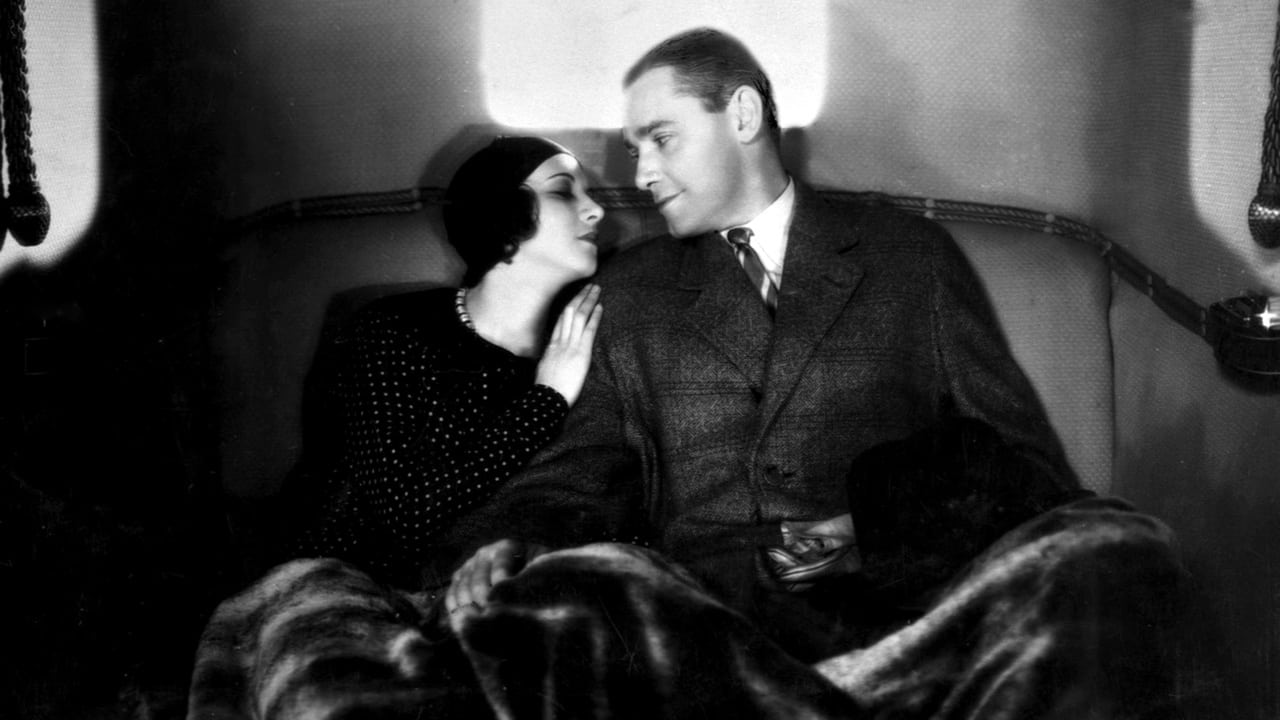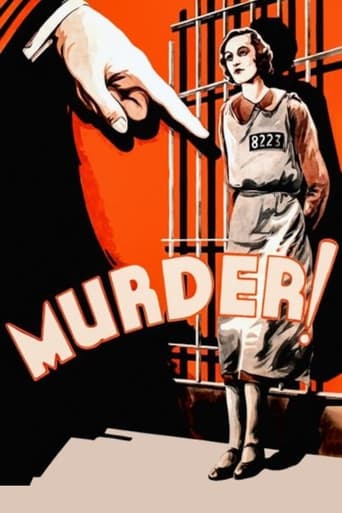

'Murder!' is much thrilling and better movie than its current (2018) score might imply, although bit meandering and uneven in pacing the story is still interesting and well though out. The opening scene where camera movies along the street and people open their windows to the noise is pure example of genius director at work. The courtroom scene and the one after that where the jury argues over the verdict is wonderfully suspenseful. With the jury scene Hitchcock also plays wonderful trick how people with different opinions and understandings are sometimes simply bullied to agree with the great majority without even listening their arguments. The middle part of the film where the main character tries to solve the murder, although offering some humorous moments might seem bit dull to some, but shortly before the great reveal, the film picks up the pace and thrills when the main character starts his cat and mouse game with the supposed killer. And then the thrilling ending.Definitely worthwhile early Hitchcock picture.
... View MoreThis early Hitchcock feature is full of innovations typical of Hitchcock in his early days of the talkies, which were sometimes wildly experimental, like here. At the same time it's his slowest film, you have to be patient with some trying scenes, but the main asset of the film is the very shrewd story. Two actresses, who have been quarrelling rivals, meet to make peace, which meeting ends with one of them being found dead, battered to death by a poker lying beside her, while the other actress sits paralysed and can't remember anything. She is brought to trial, of course, and the jury seems to take it for granted that she must be guilty, there is no other explanation, while Herbert Marshall is the last jury member to be persuaded to agree on the verdict, which he afterwards regrets, he continues brooding on the issue, and then comes the great shaving scene, which is central in the film. He shaves while there is his monologue, and as the radio playing Wagner's Tristan overture reaches an emotional peak, the clue to the mystery dawns upon him, and he starts his own investigation together with another actor of the theatre.There are many interesting scenes, for instance when the police question the actors during am om-going theatre performance, the famous jury session, striking details such as the loose teeth, and the famous climax, where Hitchcock proves himself fully fledged.The music plays an important part here, especially the circus orchestra sharpens your attention, but the ingenious plot is the main thing. Pardon the slow motion, but it's still definitely Hitchcock.
... View MoreThis was only third talking picture from the Master of Suspense director Sir Alfred Hitchcock (Rear Window, Vertigo, North by Northwest, Psycho, The Birds), the simple title made it obvious what it was about, it was rated average by critics, but I was always going to watch it. Basically Diana Baring (Norah Baring) is a young actress in a travelling troupe, she is found in a daze with blood on her clothes, standing by the murdered body of another young actress, Edna Druce (Aileen Despard). The fire poker used to commit the murder is at Diana's feet, but she has no memory of what happened during the time that the crime was committed. It is thought that the two young women were rivals, the police arrest Diana, she deliberately withholds important information, to protect something about the identity of a man that she will not name. At Diana's trial, most of the jury are certain she is guilty, one or two believe she has a mental illness, that would explain her lack of memory, but they are convinced that should face the death penalty, hanging, so as not to strike again. Celebrated actor-manager Sir John Menier (Herbert Marshall) is a juror, is convinced that Diana is innocent, he is almost bullied into voting "guilty" with the rest of the jury, Diana is imprisoned and will be hanged. Sir John feels responsible, as he recommended the beautiful Diana take the touring job, to gain more life experience, and it turns Diana has been a fan of his since childhood, he feels she is far too honest and straightforward to be any kind of criminal. Using skills he has learned in the theatre, Sir John investigates the murder, with the help of stage manager Ted Markham (Edward Chapman) and his wife Doucie (Phyllis Konstam). The narrow down the possible suspects who could have committed the murder to troupe male actor Handel Fane (Esme Percy), who often plays cross-dressing roles. Sir John cleverly tries to lure a confession out of Fane, auditioning him for a new play he written, about murder, Fane realises they know that he is the real murderer, as well how and why he did it. Fane leaves the audition without confessing, he returns to his old job as a trapeze artist in the circus, Sir John and the others go there to confront him again, Fane sees them from his high perch during his performance, in despair he knots the access rope into a noose, puts it around his head and hangs himself. Diana is freed, having been proven innocent, dressed in glamourous clothing she is greeted in a beautiful room by Sir John, they embrace as he loves her, but the camera pulls back, this is actually a stage play performance, Diana is starring opposite Sir John in what may be the new play he was planning. Also starring Miles Mander as Gordon Druce and Donald Calthrop as Ion Stewart, and Hitchcock's cameo is as the Man on Street passing the three standing outside the door. This is a fairly simple whodunnit style story, a member of the jury who found an innocent woman guilty going on a snoop of their own, the performances are all fine, and there are small memorable moments, but it is a little creaky, rather stagey, and not all that engaging compared other Hitchcock films, but not a bad mystery. Worth watching!
... View MoreA mystery movie adapted from the novel and play titled ¨Enter Sir John¨by Clemence Dane and Helen Simpson . It deals with a girl (Norah Baring) silently accepts her prosecution for killing , while the jury is deliberating , there is a lone juror (Herbert Marshall) who believes in her innocence begins an investigation his own and winds up discovering weird happenings .This fine early effort by Hitch has several novelties , as the movie transcends the limitation of its mystery plot by dealing with thought-provoking issues and focusing on the theatrical meditations of reality . An early talkie for Great Britain in which director Hitch features visualization of some typical Hitchcockian themes , being perhaps the most provocative of all early British films , adding the first gay stereotype in popular cinema and the first movie where a person's thoughts are presented by a voice-in-off . The story follows mysteriously the investigation of a murder and the protagonist attempts to keep the condemned girl from being executed to death penalty by hanging . One of the first and best Alfred film to explore the ideas and themes that would become his trademarks , including climatic and memorable scenes . Herbert Marshall gives a good interpretation as the jurist believing in a young woman's innocence and starts organizing the pieces of the crime in order to save her . Look closely for the Master in a rapid cameo about an hour into the film walking past the house where the murder was committed and Una O'Connor , John Ford's regular ; besides , brief acting by Miles Mander .The film belongs to Hitch's first British period when he directed silent films such as ¨The lodger¨ (1926) , ¨The ring¨(1927) , ¨Easy virtue¨ (1927) , ¨The Manxman¨(29) ; being ¨Blackmail¨(29) made as a silent , this was reworked to become a talkie . Following sound movies and early talkies as ¨June and the Paycock¨(30) , ¨Skin Game¨(31) , ¨Rich and strange¨(32) , ¨Number 17¨(32) , ¨The man who knew too much¨(34) , ¨The 39 steps¨ (35) , ¨The secret agent¨(36) , ¨Sabotage¨(36) , ¨The lady vanishes¨(38) , ¨Jamaica Inn¨ (39) until he is hired by David O'Selznick to shoot ¨Rebecca¨(40) in the US .
... View More